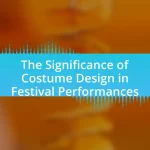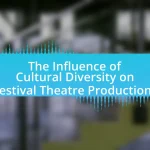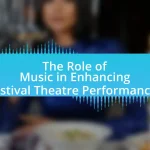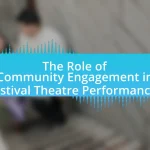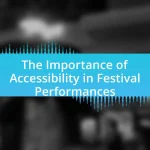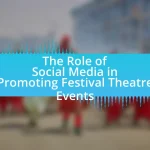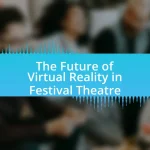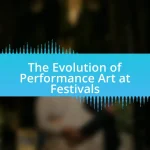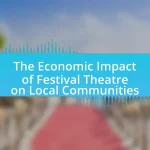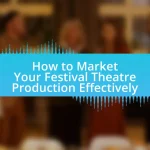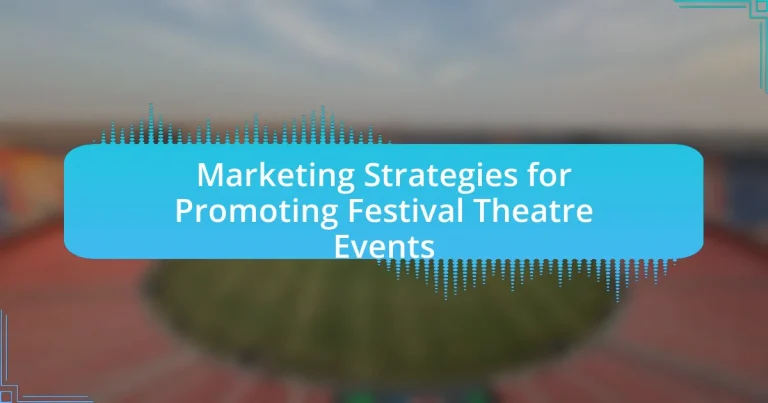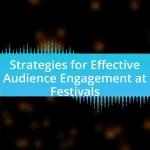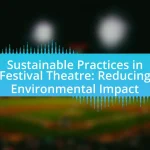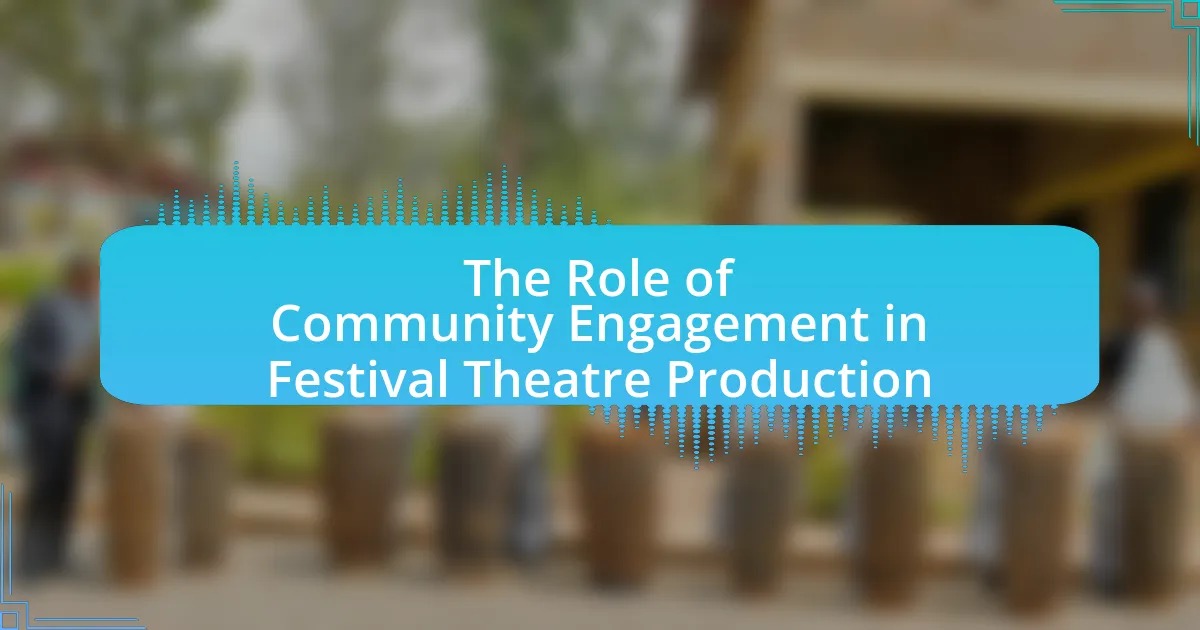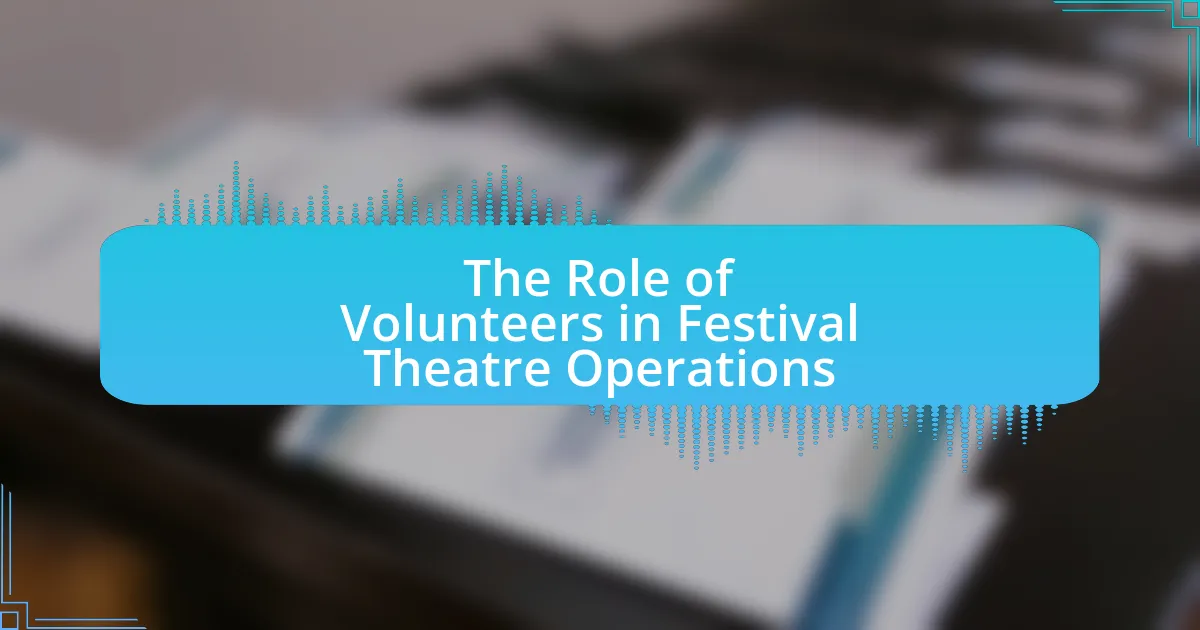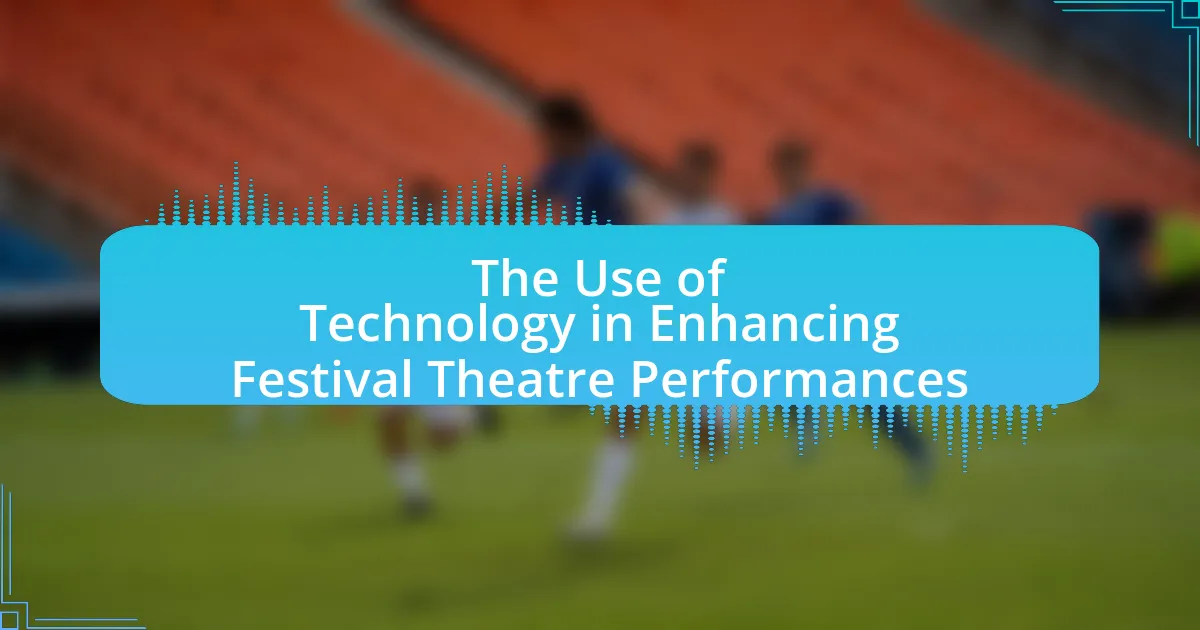The article focuses on effective marketing strategies for promoting festival theatre events, emphasizing the importance of social media, influencer collaborations, and targeted email campaigns. It highlights how these strategies enhance audience engagement, increase ticket sales, and improve overall visibility. Key components of a successful marketing plan include understanding target demographics, utilizing various promotional channels, and measuring effectiveness through metrics such as ROI and audience feedback. Additionally, the article addresses challenges faced in marketing, such as competition and budget constraints, while suggesting innovative approaches to overcome these obstacles and maintain audience interest.
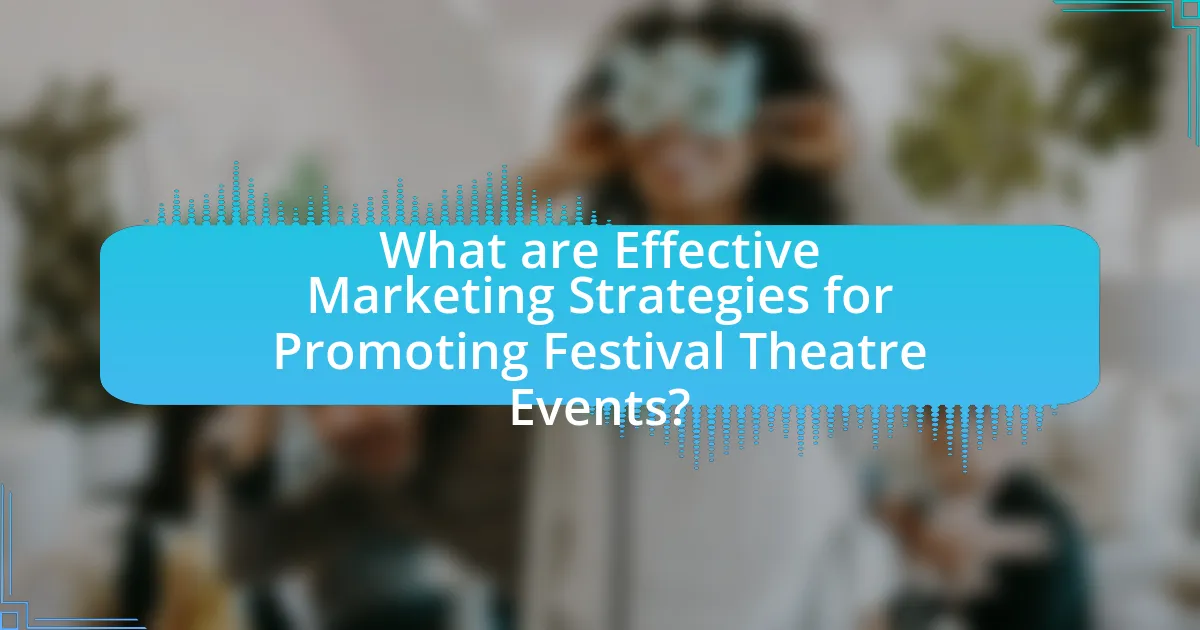
What are Effective Marketing Strategies for Promoting Festival Theatre Events?
Effective marketing strategies for promoting festival theatre events include leveraging social media, collaborating with local influencers, and utilizing targeted email campaigns. Social media platforms like Facebook and Instagram allow for engaging content sharing, which can reach a broad audience; for instance, 73% of marketers believe that social media marketing has been effective for their business. Collaborating with local influencers can enhance visibility and credibility, as influencers often have dedicated followings that trust their recommendations. Targeted email campaigns can effectively reach past attendees and interested individuals, with studies showing that email marketing has an average ROI of $42 for every dollar spent. These strategies, when combined, create a comprehensive approach to effectively promote festival theatre events.
How do marketing strategies impact audience engagement for festival theatre events?
Marketing strategies significantly enhance audience engagement for festival theatre events by effectively targeting and communicating with potential attendees. These strategies utilize various channels, such as social media, email marketing, and partnerships, to create awareness and excitement around the events. For instance, a study by the National Endowment for the Arts found that targeted marketing campaigns can increase attendance by up to 30%, demonstrating the direct correlation between strategic outreach and audience participation. Additionally, engaging content, such as behind-the-scenes videos and interactive promotions, fosters a sense of community and anticipation, further driving engagement.
What role does social media play in promoting festival theatre events?
Social media plays a crucial role in promoting festival theatre events by providing a platform for widespread engagement and targeted marketing. It enables festival organizers to reach diverse audiences through tailored content, such as event announcements, behind-the-scenes footage, and interactive posts. According to a study by the Pew Research Center, 69% of adults in the U.S. use social media, making it an effective channel for reaching potential attendees. Additionally, social media facilitates real-time communication and community building, allowing audiences to share experiences and generate buzz around events, which can significantly increase ticket sales and attendance.
How can email marketing enhance ticket sales for festival theatre events?
Email marketing can enhance ticket sales for festival theatre events by directly reaching a targeted audience with personalized promotions and timely information. This strategy allows event organizers to segment their audience based on preferences and past attendance, enabling tailored messaging that resonates with specific groups. According to a study by the Direct Marketing Association, email marketing has an average return on investment of $42 for every dollar spent, demonstrating its effectiveness in driving sales. Additionally, sending reminders and exclusive offers through email can create urgency and encourage immediate purchases, further boosting ticket sales.
Why is understanding the target audience crucial for marketing festival theatre events?
Understanding the target audience is crucial for marketing festival theatre events because it enables marketers to tailor their messaging and promotional strategies effectively. By identifying the demographics, preferences, and behaviors of potential attendees, marketers can create targeted campaigns that resonate with specific groups, increasing engagement and ticket sales. For instance, research indicates that 70% of consumers are more likely to engage with personalized content, highlighting the importance of audience understanding in driving successful marketing outcomes.
What demographics should be considered when targeting audiences for festival theatre events?
When targeting audiences for festival theatre events, key demographics to consider include age, income level, education, and geographic location. Age influences preferences for types of performances, with younger audiences often favoring contemporary works and older audiences gravitating towards classic productions. Income level affects ticket purchasing power, with higher-income individuals more likely to attend premium events. Education correlates with cultural engagement, as individuals with higher education levels tend to attend more arts events. Geographic location is crucial, as local audiences may have different interests compared to tourists. According to the National Endowment for the Arts, demographic factors significantly impact attendance patterns, highlighting the importance of tailoring marketing strategies to these specific audience segments.
How can audience preferences shape marketing strategies for festival theatre events?
Audience preferences significantly shape marketing strategies for festival theatre events by guiding the selection of promotional channels, content, and messaging. Understanding what audiences value—such as genre, themes, or specific artists—allows marketers to tailor their campaigns effectively. For instance, if data shows that a target audience prefers contemporary plays over classical ones, marketing efforts can focus on highlighting modern productions, utilizing social media platforms popular among that demographic, and engaging with influencers who resonate with those preferences. This targeted approach not only increases engagement but also enhances ticket sales, as evidenced by a study from the National Endowment for the Arts, which found that tailored marketing strategies can boost attendance by up to 30% when aligned with audience interests.
What are the key components of a successful marketing plan for festival theatre events?
The key components of a successful marketing plan for festival theatre events include target audience identification, branding, promotional strategies, partnerships, and evaluation metrics. Target audience identification involves understanding demographics and preferences to tailor marketing efforts effectively. Branding establishes a unique identity for the festival, enhancing recognition and appeal. Promotional strategies encompass various channels such as social media, email marketing, and traditional advertising to reach potential attendees. Partnerships with local businesses and influencers can amplify outreach and engagement. Finally, evaluation metrics, such as ticket sales and audience feedback, are essential for assessing the effectiveness of the marketing plan and making necessary adjustments.
How can partnerships with local businesses enhance marketing efforts?
Partnerships with local businesses can enhance marketing efforts by leveraging shared audiences and resources, thereby increasing visibility and engagement. When festival theatre events collaborate with local businesses, they can cross-promote each other’s offerings, reaching a wider audience that may not have been aware of the event. For instance, a local restaurant might offer discounts to theatre ticket holders, encouraging patrons to dine before or after the show, which not only drives traffic to the restaurant but also promotes the theatre event. According to a study by the American Marketing Association, businesses that engage in local partnerships see an average increase of 20% in customer engagement and brand awareness. This synergy creates a mutually beneficial relationship that amplifies marketing reach and effectiveness.
What budget considerations are important when planning marketing strategies?
When planning marketing strategies, important budget considerations include allocation for advertising, promotional materials, and digital marketing efforts. Specifically, allocating funds for targeted advertising on social media platforms can yield high engagement rates, with studies showing that businesses earn an average of $2.80 for every dollar spent on Facebook ads. Additionally, budgeting for high-quality promotional materials, such as posters and flyers, is essential, as visually appealing content can increase audience interest and attendance. Furthermore, setting aside a portion of the budget for analytics tools is crucial, as these tools help measure the effectiveness of marketing campaigns, allowing for data-driven adjustments.
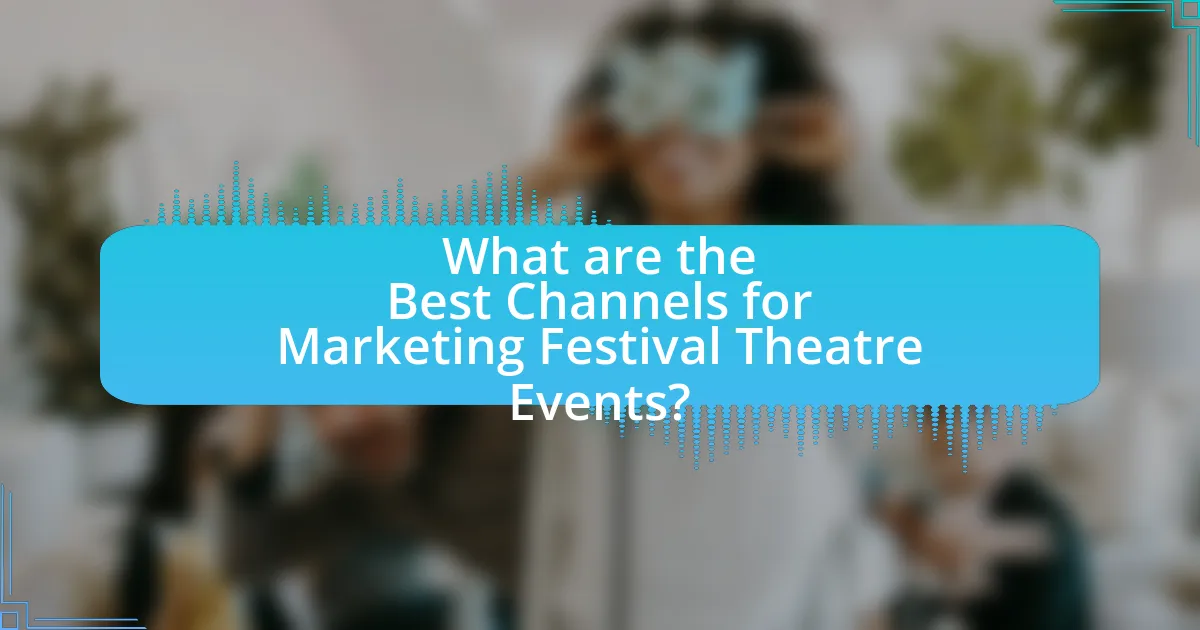
What are the Best Channels for Marketing Festival Theatre Events?
The best channels for marketing festival theatre events include social media platforms, email marketing, and local partnerships. Social media platforms like Facebook and Instagram allow for targeted advertising and engagement with potential attendees, as they have large user bases and tools for event promotion. Email marketing enables direct communication with interested audiences, providing updates and exclusive offers, which can increase ticket sales. Local partnerships with businesses and community organizations can enhance visibility and credibility, as they can help reach a wider audience through cross-promotion. According to a study by Eventbrite, 80% of event organizers find social media to be the most effective marketing channel, highlighting its importance in reaching potential attendees.
How can traditional media be utilized in promoting festival theatre events?
Traditional media can be effectively utilized in promoting festival theatre events through targeted advertising, press coverage, and community engagement. Advertising in newspapers, magazines, and on radio stations allows festival organizers to reach specific demographics that are likely to attend theatre events. For instance, local newspapers often have dedicated arts sections where festival events can be featured, increasing visibility among potential attendees.
Press coverage can enhance credibility and attract a wider audience; reviews and articles about the festival in traditional media outlets can generate interest and excitement. Additionally, engaging with the community through local radio interviews or public service announcements can create a personal connection and encourage attendance. According to a study by the National Endowment for the Arts, traditional media remains a significant source of information for audiences seeking cultural events, underscoring its importance in festival promotion.
What types of print advertising are most effective for festival theatre events?
The most effective types of print advertising for festival theatre events include posters, flyers, and program booklets. Posters are visually impactful and can be strategically placed in high-traffic areas to attract attention, while flyers allow for direct distribution to target audiences, enhancing reach. Program booklets serve as both informational resources and keepsakes, providing detailed insights into the event and its performances. Research indicates that 70% of attendees recall seeing posters or flyers prior to attending an event, demonstrating their effectiveness in creating awareness and driving attendance.
How can radio and television advertising reach potential audiences?
Radio and television advertising can reach potential audiences by utilizing targeted programming and demographic analysis. Advertisers can select specific time slots and channels that align with the interests and viewing habits of their desired audience, ensuring that their message is delivered to the right people. For instance, a study by Nielsen indicates that 92% of adults listen to the radio weekly, providing a broad platform for reaching diverse demographics. Additionally, television advertising can leverage prime time slots and popular shows to maximize visibility, as data shows that 70% of viewers recall ads seen during their favorite programs. By strategically placing ads in these mediums, marketers can effectively engage potential audiences for festival theatre events.
What digital marketing channels are most effective for festival theatre events?
Social media platforms, particularly Facebook and Instagram, are the most effective digital marketing channels for festival theatre events. These platforms allow for targeted advertising, enabling marketers to reach specific demographics interested in theatre and cultural events. According to a study by Eventbrite, 80% of event organizers reported that social media was their most effective marketing tool, highlighting its importance in driving ticket sales and engagement. Additionally, email marketing remains a strong channel, with a return on investment of $42 for every dollar spent, making it a valuable tool for promoting festival theatre events.
How can search engine optimization (SEO) improve visibility for festival theatre events?
Search engine optimization (SEO) can significantly improve visibility for festival theatre events by enhancing their online presence and searchability. By optimizing website content with relevant keywords, festival theatre events can rank higher in search engine results, making it easier for potential attendees to find information about the events. For instance, using specific phrases like “summer theatre festival” or “local theatre events” can attract targeted traffic. Additionally, implementing local SEO strategies, such as optimizing Google My Business listings, can help festival theatre events appear in local searches, increasing foot traffic and ticket sales. According to a study by HubSpot, 75% of users never scroll past the first page of search results, underscoring the importance of SEO in achieving visibility.
What role do online ticketing platforms play in marketing festival theatre events?
Online ticketing platforms serve as crucial marketing tools for festival theatre events by providing a centralized location for ticket sales and promotional activities. These platforms enhance visibility through targeted advertising, social media integration, and email marketing, reaching a broader audience. For instance, platforms like Eventbrite and Ticketmaster utilize algorithms to suggest events to users based on their preferences, increasing the likelihood of ticket purchases. Additionally, they offer analytics that help event organizers understand audience demographics and purchasing behaviors, enabling more effective marketing strategies. This data-driven approach has been shown to improve ticket sales significantly, with studies indicating that events promoted through online ticketing platforms can see up to a 30% increase in attendance compared to those relying solely on traditional marketing methods.
How can influencer marketing be leveraged for festival theatre events?
Influencer marketing can be leveraged for festival theatre events by partnering with social media influencers who have a strong following in the arts and entertainment niche. These influencers can create engaging content that showcases the festival’s unique offerings, such as behind-the-scenes access, interviews with performers, and live event coverage. Research indicates that 49% of consumers depend on influencer recommendations, which can significantly enhance ticket sales and audience engagement for theatre festivals. By utilizing influencers’ reach and credibility, festival organizers can effectively target specific demographics and increase visibility, ultimately driving attendance and fostering a community around the event.
What criteria should be used to select influencers for promoting festival theatre events?
To select influencers for promoting festival theatre events, focus on their audience alignment, engagement rates, and relevance to the theatre community. Audience alignment ensures that the influencer’s followers match the target demographic of the festival, which can be assessed through analytics tools that provide insights into follower demographics. Engagement rates, measured by likes, comments, and shares, indicate how actively the influencer interacts with their audience, which is crucial for effective promotion. Relevance to the theatre community can be evaluated by the influencer’s previous content, collaborations, and overall interest in the arts, ensuring they resonate with the festival’s themes and values. These criteria are essential for maximizing the impact of influencer marketing in the context of festival theatre events.
How can collaborations with influencers enhance audience reach?
Collaborations with influencers can significantly enhance audience reach by leveraging their established follower base and credibility. Influencers possess the ability to engage niche audiences that align with specific interests, such as festival theatre events, thereby increasing visibility among potential attendees. For instance, a study by the Digital Marketing Institute found that 49% of consumers depend on influencer recommendations when making purchasing decisions, highlighting the effectiveness of influencer partnerships in driving engagement and attendance. By promoting festival theatre events through influencers, organizations can tap into these engaged communities, resulting in a broader and more targeted audience reach.
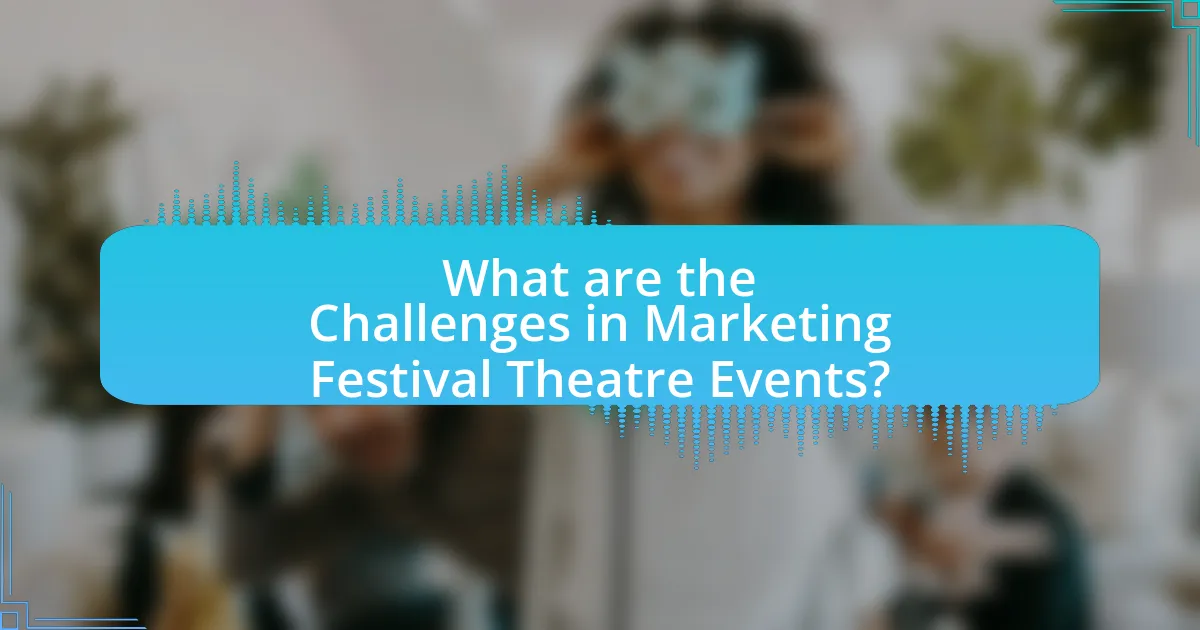
What are the Challenges in Marketing Festival Theatre Events?
The challenges in marketing festival theatre events include competition for audience attention, limited budgets, and the need for effective audience engagement. Competition arises from numerous entertainment options available to potential attendees, making it difficult for festival theatre events to stand out. Limited budgets restrict marketing reach and the ability to utilize diverse promotional channels, which can hinder visibility. Additionally, engaging audiences effectively is crucial, as festival theatre events often require innovative strategies to attract and retain interest, especially in a digital landscape where consumer preferences rapidly change. These challenges necessitate targeted marketing strategies that can adapt to the evolving entertainment environment.
What common obstacles do marketers face when promoting festival theatre events?
Marketers face several common obstacles when promoting festival theatre events, including limited budgets, competition for audience attention, and challenges in reaching target demographics. Limited budgets restrict the scope of marketing campaigns, making it difficult to utilize diverse channels effectively. Competition from other entertainment options, such as concerts and sporting events, can dilute audience interest and attendance. Additionally, reaching specific target demographics can be challenging due to varying media consumption habits, which necessitates tailored marketing strategies to engage different audience segments effectively.
How can competition from other entertainment options affect marketing strategies?
Competition from other entertainment options can significantly influence marketing strategies by necessitating differentiation and targeted messaging. As audiences have diverse choices, such as streaming services, live sports, and gaming, festival theatre marketers must emphasize unique aspects of their events, like exclusive performances or immersive experiences. For instance, a study by the National Endowment for the Arts found that 45% of adults in the U.S. attended a live performance in 2017, highlighting the need for theatre marketers to create compelling narratives and promotional campaigns that resonate with potential attendees. This competitive landscape drives the adoption of innovative marketing tactics, such as social media engagement and partnerships with influencers, to capture audience attention and drive ticket sales.
What are the challenges of maintaining audience interest over time?
Maintaining audience interest over time presents several challenges, including audience fatigue, changing preferences, and competition from alternative entertainment options. Audience fatigue occurs when individuals become desensitized to repeated marketing messages or similar events, leading to decreased engagement. Changing preferences highlight the need for continuous adaptation to evolving tastes and cultural trends, as audiences may seek new experiences that resonate with their current interests. Additionally, competition from various entertainment forms, such as streaming services and social media, diverts attention away from festival theatre events, making it essential for marketers to innovate and differentiate their offerings to retain interest.
How can marketers measure the effectiveness of their strategies for festival theatre events?
Marketers can measure the effectiveness of their strategies for festival theatre events by analyzing key performance indicators (KPIs) such as ticket sales, audience attendance, social media engagement, and customer feedback. For instance, tracking ticket sales before, during, and after the event provides direct insight into the success of promotional efforts. Additionally, monitoring social media metrics, such as likes, shares, and comments, can indicate audience interest and engagement levels. Surveys and feedback forms collected from attendees can further assess satisfaction and areas for improvement. According to a study by the National Endowment for the Arts, events that actively engage with their audience through digital platforms see a 30% increase in attendance, highlighting the importance of effective marketing strategies.
What metrics should be tracked to evaluate marketing success?
To evaluate marketing success for festival theatre events, key metrics to track include return on investment (ROI), ticket sales, audience engagement, and conversion rates. ROI measures the profitability of marketing efforts, indicating how much revenue is generated for every dollar spent. Ticket sales provide direct insight into the effectiveness of promotional strategies, while audience engagement metrics, such as social media interactions and email open rates, reflect the level of interest and connection with the target audience. Conversion rates, which track the percentage of potential customers who take a desired action, such as purchasing tickets after engaging with marketing content, further demonstrate the success of marketing initiatives. These metrics collectively offer a comprehensive view of marketing effectiveness in driving attendance and revenue for festival theatre events.
How can feedback from audiences inform future marketing strategies?
Feedback from audiences can significantly inform future marketing strategies by providing insights into customer preferences and behaviors. Analyzing audience feedback allows marketers to identify what aspects of festival theatre events resonate most, such as specific genres, performance styles, or promotional channels. For instance, a survey conducted after a festival may reveal that attendees preferred interactive social media campaigns over traditional advertising, guiding future marketing efforts to focus on digital engagement. Additionally, audience feedback can highlight areas for improvement, such as ticket pricing or accessibility, enabling marketers to adjust their strategies to enhance customer satisfaction and increase attendance. This data-driven approach ensures that marketing strategies are aligned with audience expectations, ultimately leading to more effective promotions and higher engagement rates.
What are some best practices for overcoming marketing challenges in festival theatre events?
To overcome marketing challenges in festival theatre events, implementing targeted audience segmentation is essential. By identifying specific demographics and tailoring marketing messages to resonate with those groups, festival organizers can enhance engagement and ticket sales. For instance, research indicates that personalized marketing can increase conversion rates by up to 10% (Source: HubSpot, 2021). Additionally, leveraging social media platforms for real-time engagement and utilizing influencer partnerships can amplify reach and visibility, addressing the challenge of limited marketing budgets. According to a study by Eventbrite, 80% of event organizers found social media to be effective in promoting their events. These strategies collectively help in navigating the complexities of marketing within the festival theatre landscape.
How can continuous engagement strategies improve audience retention?
Continuous engagement strategies significantly improve audience retention by fostering a deeper connection between the audience and the event. These strategies, such as regular communication through newsletters, social media interactions, and personalized content, keep the audience informed and invested in the festival theatre experience. Research indicates that consistent engagement can lead to a 50% increase in audience loyalty, as it creates a sense of community and belonging. For instance, a study by the Event Marketing Institute found that 74% of attendees are more likely to return to an event if they feel engaged before, during, and after the experience. This demonstrates that ongoing interaction not only enhances the audience’s emotional investment but also encourages repeat attendance, ultimately leading to higher retention rates.
What innovative approaches can be adopted to enhance marketing effectiveness?
Innovative approaches to enhance marketing effectiveness include leveraging data analytics for targeted campaigns, utilizing social media influencers for broader reach, and implementing immersive technologies like augmented reality to engage audiences. Data analytics allows marketers to segment audiences based on behavior and preferences, leading to personalized messaging that increases conversion rates. For instance, a study by McKinsey found that companies using advanced analytics can improve marketing ROI by 15-20%. Collaborating with social media influencers can amplify brand visibility, as 49% of consumers depend on influencer recommendations for their purchasing decisions, according to a survey by Nielsen. Additionally, immersive technologies, such as augmented reality experiences, can create memorable interactions, with 61% of consumers preferring brands that offer such innovative experiences, as reported by Deloitte.
